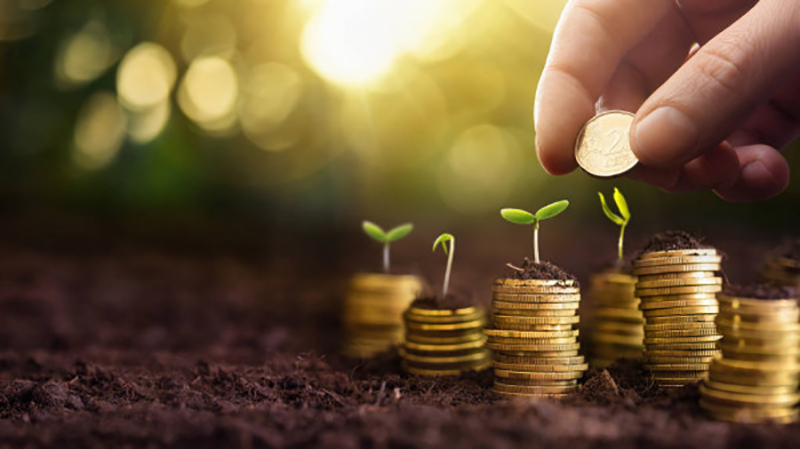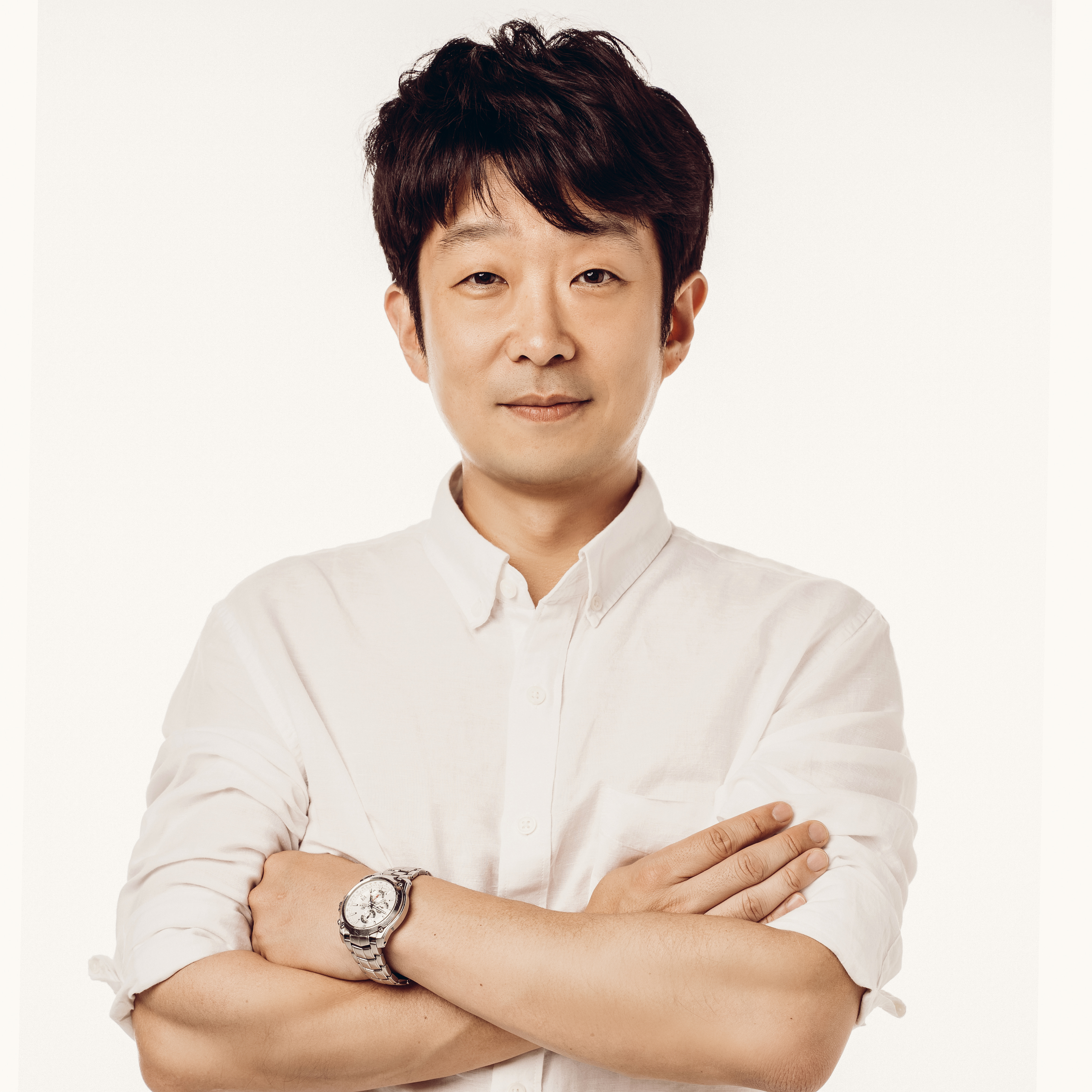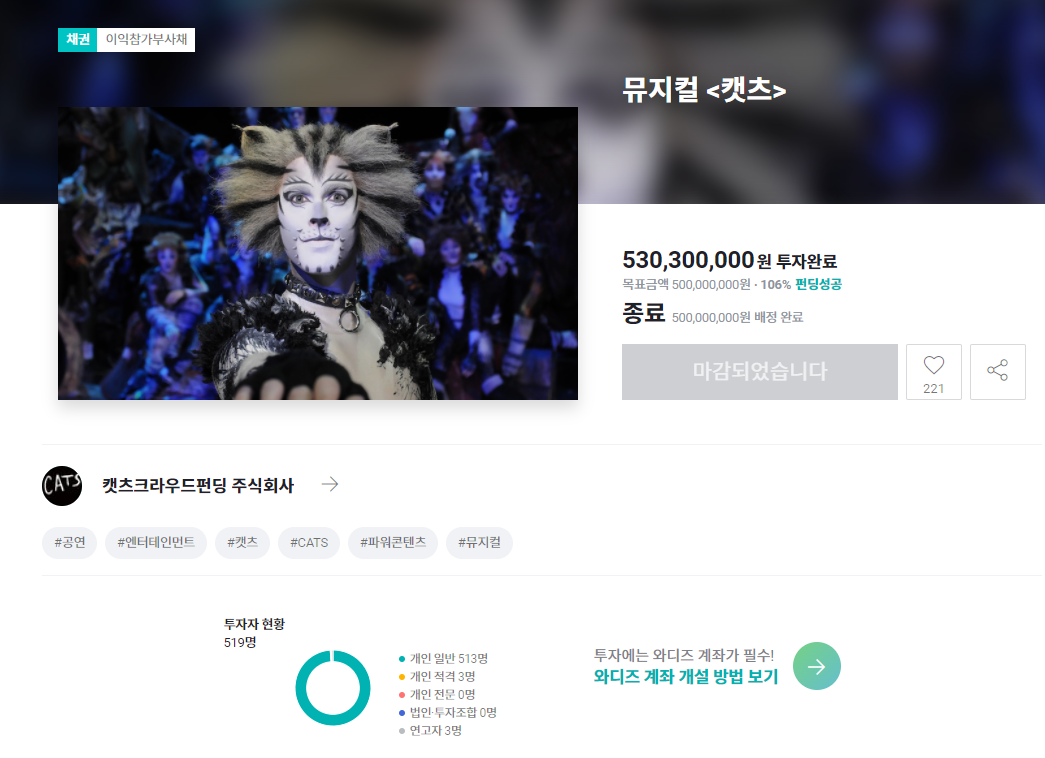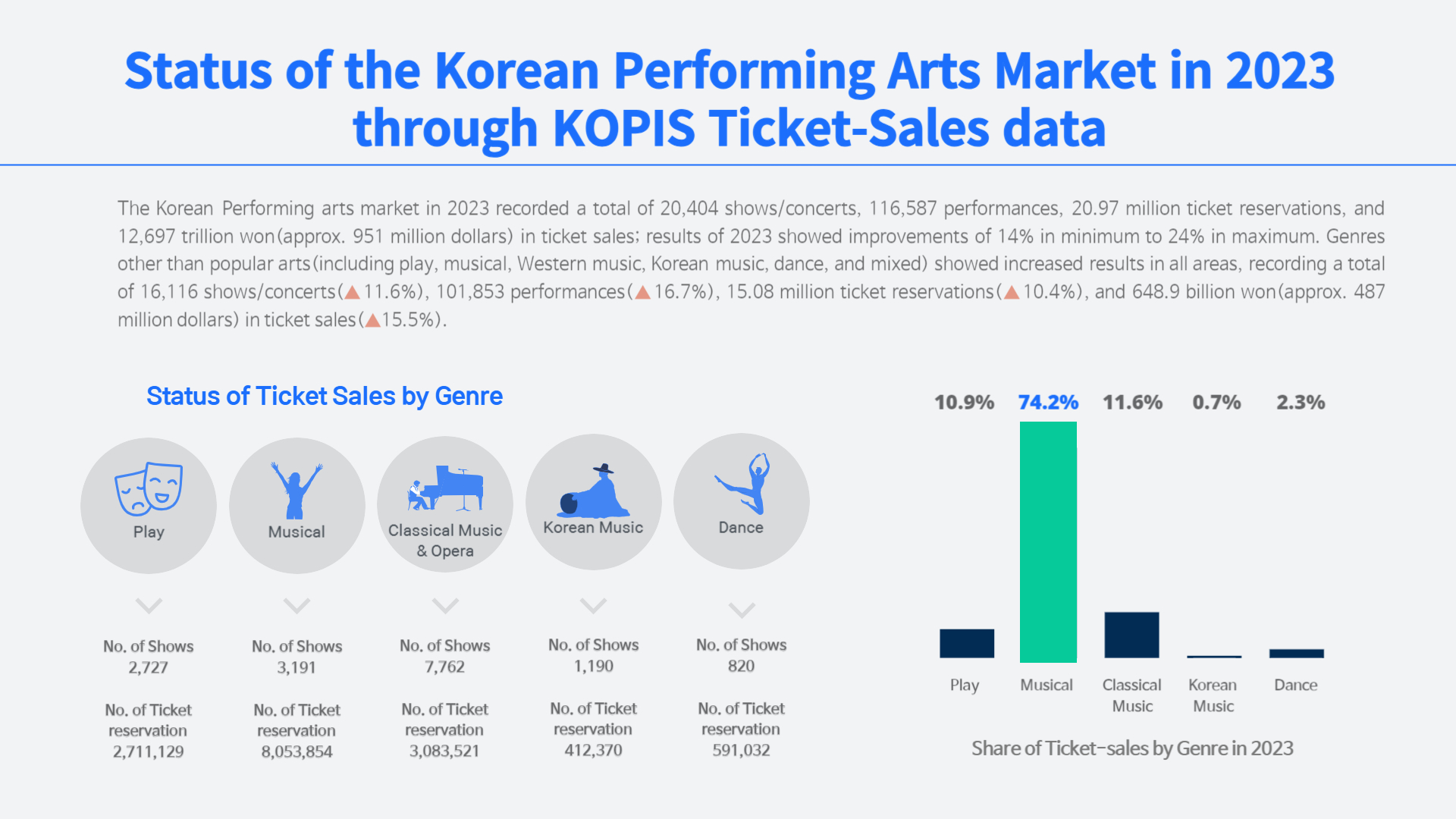About the Investment Environment of Korean Musicals
_Round-Table Talk Between Producers and an Investor
Park ByungSung_performing arts columnist

Making an industry out of the performing arts requires investment. In Korea, investment in the performing arts still isn’t as vigorous as that in neighboring genres such as videos and webtoons. The Korea Arts Management Service organizes the K-Musical Market in an attempt to seek the development of the Korean musical theatre market and to form a sound investment environment. What environment would we need to ensure seamless investment in the live performance industry? So we first invited Mr. Lee Hyunjae, CEO of Neo Production, and Mr. Kang Byeungwon, CEO of Live. Both companies are Korea’s representative producers of creative musicals. We also invited Mr. Yoon SungWook, CEO of K-content platform Funderful. The three discussants talked about the Korean musical theatre market and investment environment. Mr. Park ByungSung, editor-in-chief of monthly magazine〈Performing Arts Information Network〉, served as the moderator of the round-table talk.
Performing Arts Market with a Sufficient Value for Investment
| ByungSung | Could you tell us about Korea’s current environment and state of investment in the musical theatre? |
| Byeungwon | I don’t know exactly about the overall environment of the market. But as for live performances, about 50% of the works that are produced benefit from investment, which accounts for 70 to 80% of the total production cost. Performances that are presented twice or more are likely to secure investment on the basis of their previous results while premieres struggle to find investors. |
| Hyunjae | eople generally think that investment is essential for films. Without investment, films cannot be produced. But as for performances, producers first rent a theatre space at the time when they plan and develop content, regardless of whether investment would be available or not. So the first priority for producing performances is to rent a theatre space. Before renting it, producers cannot secure investment. And if they fail to find an investor, they can’t cancel the space rental by paying for the cancellation charge. In short, investment isn’t an essential element of performance production in Korea. |
| ByungSung | Compared to films and TV series, performances have a low rate of return. There are not many sources of profits in addition to ticket sales. So producers of performances don’t expect much. In particular, Korea has a large number of creative musicals but their market share in the Korean musical theatre market is only about 30%. Do you think that performances are attractive as investment products? |
| Hyunjae | The absolute amount that a performance gains is not big. But performances are very likely to make profits. The profits aren’t as large as those of films but the cumulative sales revenue of one performance’s intellectual property is similar to that of a low-cost film. Moreover, performances aren’t staged just once and they could meet the audience twice or three times. So I believe that it is a content industry with great potential. |
| SungWook | The performing arts markets in the US and UK have been proven to be those with high added value. You said that creative musicals just account for 30% of the Korean musical theatre market. But that number means that the Korean market is really great. Besides the UK and US, there is almost no country with such a high market share of its own musicals. So we need to be optimistic about the Korean musical theatre market. The market has sufficient potential for growh. In this regard, we should bring outside capital to a billion-won production to make it grow into a 10 billion-won work. And profits made in this process could lead to reinvestment. It is important to make such a structure of investment. |
| Hyunjae | Still, we mention the issue of public support even as we discuss investment in performances. Support and investment are two different things. If we discuss investment without separating the two, we will inevitably turn to support again. We should openly share documents on how the performing arts industry is gaining success so that this topic could be discussed publicly. What counts is how we view and interpret this market in order to make people aware of its sufficient industrial value. I believe that creative musicals constitute a market that is sufficiently good for investment. |
 Lee Hyunjae, CEO of Neo Production |
| ByungSung | Large-scale licensed musicals relatively benefit from more investment. And among creative musicals, those that prove their quality and that are presented again tend to win investment. Producers would be more desperate to find investors for their premieres but it is difficult for them to do so. | |
| Byeungwon | We could tackle this issue with a policy-oriented approach. From a fund of funds, in which the government invests, a certain amount could be allocated for the premieres of creative musicals. | |
| SungWook | First of all, the planning and development cost could be retrieved for several years. At the same time, royalties from initial investment could also be accepted. In such a structure, producers could benefit from package-type investment for their second and third stagings, even if it is difficult for them to win investment in their premieres. |
To Vitalize Investment in Performances
| ByungSung | What do we need more to vitalize investment in performances? | |
| Hyunjae | The performing arts market is small, which gets in the way of investment decisions. When we talk to investors, they tell us to increase the overall size by combining several works, saying that the market is too small. We are actually planning a limited number of performances and we cannot combine several years of works. And we cannot increase the volume of our works just because we need investment. So these days, we think of combining several performances from different compaines, which are presented during the same period, to secure investment. | |
| SungWook | IFor investors, it takes the same amount of time to review any project, whether it be a project of 200 million won or that of 2 billion won. Considering the fund operation cost and efficiency, a project reaching a certain volume is more likely to attract investment. Investors become willing to invest if they can invest the whole amount of a project (even in a couple of years) and if they agree to the condition of retrieving their investment. |
 Yoon SungWook, CEO of Funderful |
| Byeungwon | It is necessary to increase the pie of the musical theatre market. There is a movement of making the musical theatre an independent genre in legal terms. If the musical theatre becomes eligible for legal infrastructure support like film and other content industries and if its market gets bigger, there will be more investment. | |
| SungWook | The length of a review process in an industry is also an important element for investment decisions. In the case of Korean films, more than 1,000 scenarios are reviewed every year to make 50 films. It is important to share the selection process to explain among how many works invest-winning performances have been selected. |
| ByungSung | You have invested in different types of K-content for several years. What is the most difficult part of investing in performances? |
| SungWook | What is the most difficult for investment in performances is to select works to invest in. Once investment starts, it is not difficult to allocate and spend the money. An investor decides to invest in a performance on the basis of its creator and concept and the production company’s capacity. But it is not easy for investors to evaluate these criteria. For TV series, producers or chief producers used to select works to produce but these days, they often trust collective intelligence. A case in point is a TV series studio that had to select a work. For this selection, a number of professional producers read the first three scripts of the series. After that, they voted to select a work to produce. In other words, today’s audience have different tastes so it is difficult to make a decision just based on a few people’s opinions. The performing arts market also needs a process in which professionals select works to invest in, on the basis of their collective intelligence.. |
| Hyunjae | The performing arts constitute both an industry and an art form so different values, which include fairness and justice, are highly likely to come in. When different people gather together, their goals and directions are also different so collective intelligence may not work. |

Source: Crowdfunding page of〈Cats〉
| ByungSung | Not only investors but also musical〈Cats〉has gained over 500 million won through crowdfunding. |
| SungWook | It takes at least a couple of months to receive 500 million won from an investor. In contrast, online investment could be done even in a single day if it is for content with a fandom.〈Cats〉reached its goal of the investment amount in just a few minutes. Live content is an involvement-oriented product which requires the audience’s willingness to consume it. Online investment is actively done for small and medium-sized live content and creative content which are involvement-oriented products. A production cost includes not only the amount purely used for a performance but also the amounts for distribution, promotion and marketing. But online investment doesn’t include promotion and distribution in addition to production and consumption. Afterwards, what also counts is how to make use of the database of members that has been secured through online investment. |
| ByungSung | The K-Musical Market takes place for the first time this year. What role should this platform play? |
| Byeungwon | I hope that the platform offers an occasion for Korean musicals to reach other countries in the Asian market so that they could even achieve overseas investment or co-production. First and foremost, it is important for those from different fields in the performing arts industry to meet in one place. I would like to ask you to make sure that they feel free to make themselves known to each other and to discuss. |
 Kang Byeungwon, CEO of Live |
Park ByungSung is the editor-in-chief of monthly magazine〈Performing Arts Information Network〉and a performing arts columnist. He long served as the editor-in-chief of〈The Musical〉, a magazine specializing in musical theatre. He has a great interest in life stories unfolding on stage, which is different from reality, and he keeps reflecting on how to effectively write about the vivid impressions of performances.
He is the author of〈Avid Reading of Musical Theatre〉.








 PREV
PREV

.jpg)
.jpg)
.jpg)
.jpg)











